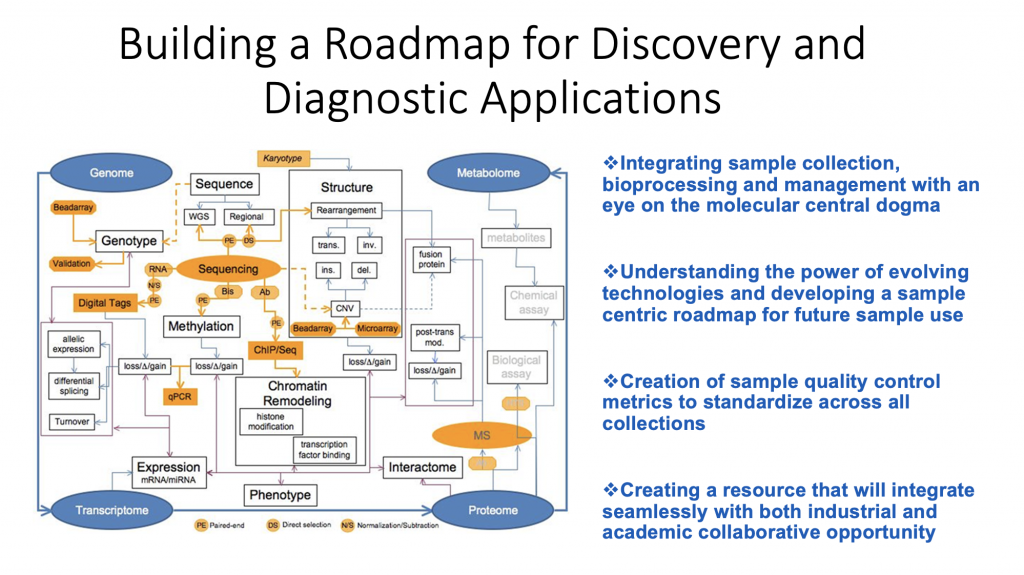The University at Buffalo (UB) Biorepository program is designed to advance discovery and innovation in healthcare by providing a unique, centralized resource of high-quality, deeply annotated biospecimens to support present and future research studies, diagnostic testing, and the creation of new therapeutics.

Biorepository services are available to:
- State University of New York institutions
- private colleges and universities
- research centers
- industry partners
What is UB’s biorepository program?
- It is an enterprise-wide resource, serving the research community and industry partners through centralized and standardized services for the collection, processing, management and distribution of biological assets.
- The biorepository enables critical clinical science research and diagnostic development, as well as the advancement of precision medicine through deep annotation and “big data” integration.
- It fosters collaborative research and strives to facilitate cross disciplinary and/or multi institutional studies and trials.
- The UB Biorepository holds a New York State Department of Health Tissue license that facilitates the collection, processing, and storage of many types of biomaterials in a regulated and compliant environment. The biorepository follows Good Laboratory Practice (GLP) and ISBER’s best practices for the management of biological specimen collections; and operates under guidelines set forth by College of American Pathologist (CAP).
- The biorepository program provides biosamples suitable for use in downstream applications with academic, pharmaceutical and biotechnology partners.
Why use the biorepository?
- To remain competitive from a grant and/or product development perspective
- Make research dollars go further by not having to recreate/support significant
infrastructure for biobanking operations - Ensure regulatory compliance of samples so none are restricted for current and future research
Biorepository Services
- Biomaterial collection and logistics
- Biomaterial processing and preservation
- Comprehensive pathology assessment and analysis
- Enterprise level digital chain of custody for all samples and services
Biorepository Procedures and Standards
The biorepository program has implemented cutting edge technology and has created a quality program to ensure that all biobank services and facilities ensure:
- Minimal variation in sample quality due to harmonized sample collection and processing Increased accuracy of biosample identity through functional QC of each sample.
- Reliable and seamless integration between sample data and quality control metrics.
- Regulatory compliant facilities and processes designed to meet the needs of
any biosample application.
Biorepository Operations
The biorepository program supports four main operations to ensure complete digital and physical chain of custody: collection, processing, storage and distribution.
Collection – Biospecimen sample collection kits are manufactured to ensure reproducible and reliable collection. Through advanced barcode processing and scanning each sample is tracked at the time of collection and data transferred into the biorepository’s laboratory information management system (e.g. origin of the sample, time the sample arrived, etc.)
Processing – Automated pre-processing (i.e. blood fractionation, pathology services) and processing (i.e. nucleic acid extraction, PBMC processing) help minimize variation of primary biosamples and their analytes for banking.
Storage – Regulated sample storage environments are available and applied to all biosamples based on the sample type specific temperature and environmental requirements. All storage environments are highly regulated, monitored 24/7/365, supported by complete and continuous back up power, and are supported by redundant freezers for uninterrupted storage. This critical piece of the service workflow ensures sample quality until the time any sample is requested for use.
Distribution – The success of any biorepository is the use of the samples it houses. In addition, the ability to retrieve samples in a safe and timely manner is a critical component to the biobank service set. Due to high quality sample storage information in the biobank LIMS and the utilization of automation friendly storage vessels the UB Biobank can support high volume sample requests on a moment’s notice.
